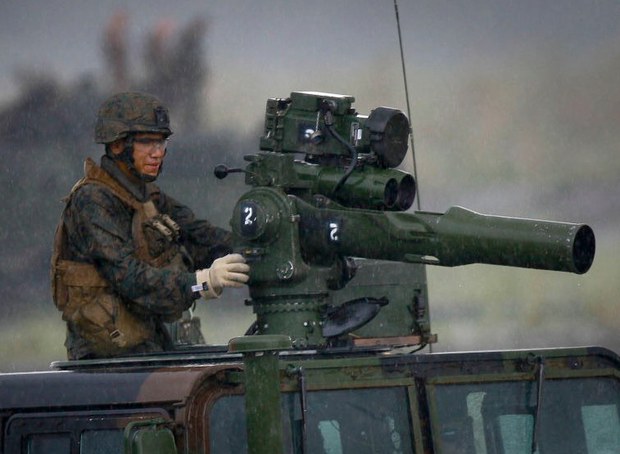Philippines Assures China It Won’t Take Part in US-Led War Games
2018.10.09
Manila
 An American gunner mans a cannon during live-fire exercises at U.S.-Philippine war games in Crow Valley, in the northern Philippine province of Tarlac, in 2009.
An American gunner mans a cannon during live-fire exercises at U.S.-Philippine war games in Crow Valley, in the northern Philippine province of Tarlac, in 2009.
President Rodrigo Duterte has assured Beijing that the Philippines will skip U.S.-led maritime exercises in the South China Sea in November, in deference to Chinese leader Xi Jinping’s scheduled visit to Manila at that time, a presidential spokesman said Tuesday.
The assurance was relayed to China’s envoy to the Philippines, Zhao Xinhua, during a meeting at the presidential palace on Monday in preparation for Xi’s upcoming trip, according to Harry Roque, Duterte’s spokesman.
“The president and Ambassador Zhao discussed the upcoming visit of President Xi to the country this November, which both agreed would further cement the already strong relations between the Philippines and China,” Roque told a press briefing.
“China of course expressed concern over … a military exercise that the United States will be conducting in the area at about the same time that the Chinese President will be in the Philippines,” he said. “The president said that we will not take part in that military exercise.”
He did not specify which U.S. naval exercises Zhao was referring to, but it was an apparent reaction to a supposed plan by the American Navy’s Pacific Fleet to conduct a series of military exercises in the disputed South China Sea for a week in November.
The drills were meant to showcase its defense capabilities, in what is billed as a major show of force in the sea. The plan also comes after the U.S. conducted several overflights and freedom of navigation tours there.
It was not clear, however, whether the United States has invited the Philippines to take part in the exercises. The American embassy in Manila did not immediately respond to calls, neither did the Philippine defense department.
Overlapping territorial claims in the South China Sea have long been a source of tension in the maritime region. China and rival Taiwan, along with Southeast Asian neighbors Malaysia, Brunei, Vietnam and the Philippines have claims to the sea, and there have been violent confrontations in the past.
But the Southeast Asian countries and China recently agreed to a draft of a “code of conduct” to govern actions in the region, even as the latter has actively carried on with its militarization efforts in the sea.
On Tuesday, Roque said both Duterte and Zhao had agreed that cooperation and joint exploration in the South China Sea “would be to each other’s interest.”
“And China reiterated that they do not desire any military confrontation as a result of the West Philippine Sea, either with any of the claimant states or with any other powers,” Roque said, using the term used by the Philippines to refer to the South China Sea.
He said that the Philippines believed that “any military confrontation in the West Philippine Sea will have dire consequences as far as Chinese commerce is concerned.”
Roque said that during a heated cabinet meeting on Monday, the consensus was they all agreed that they did not want anything to mar Xi’s upcoming visit.
“So I think the DFA will do all that it can to make sure that President Xi’s visit will be fruitful and as productive as we would want it to be,” he said, referring to the Department of Foreign Affairs.
But whether the DFA will file a complaint or talk with the U.S. about the proposed drills was also not clear. Roque did not elaborate.
“I don’t think I can go to any detail there but we want a seamless visit of President Xi,” Roque stressed.
In an interview with BBC News last week, Malaysian Prime Minister Mahathir Mohamad warned that tensions could rise further if China became agitated in the sea region.
“It may escalate if people begin to irritate and provoke China … somebody who is comparable in size and strength,” he said, as he called on all parties to de-escalate tensions there.
“Our policy is not to have battleships and warships in the South China Sea because if people start stationing their warships there, there will be tensions, there will be conflict, and it may result in a war,” Mahathir said.
Felipe Villamor in Manila contributed to this report.







